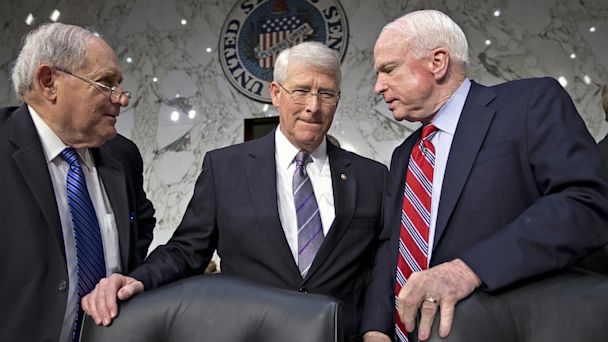Old Chamber Tapped as Symbolic Venue for 'Dysfunctional' Senate to Compromise

Credit: J. Scott Applewhite/AP Photo
It was no accident Thursday when Sen. Roger Wicker, R-Miss., proposed that the Senate meet to discuss a controversial change to filibuster rules in a room that has a history of both great bipartisanship and fierce party division: the Old Senate Chamber.
"There's a solemness to the history of that room, where so many momentous decisions were made that I think at least will give us a perspective that what we do this week has a lasting impact on history," Wicker told ABC News in an interview today hours before the meeting of the full Senate was set to take place.
The Senate will hold a private meeting in the chamber to discuss Senate Majority Leader Harry Reid's threat of the so-called "nuclear option", which would change the rules for Senate votes on President Obama's executive branch nominees, a move that Republicans have warned could backfire.
In the interview, Wicker said he was "hopeful that, once again, an accommodation can be reached" - as it was before.
And the Old Senate Chamber might, indeed, be the right setting for compromise.
Although "used primarily as a museum" now, according to Mary Baumann of the U.S. Senate Historical Office, the chamber was home to the U.S. Senate until 1859 and has since been the site for several bipartisan meetings.
Most famously, on Jan. 8 1999, "caucuses of both parties met in old chamber from 9:30 a.m. until noon to discuss framework for conducting the Clinton impeachment trial," Baumann wrote in an e-mail to ABC News. She also cited three lesser-known instances in recent history when the Old Senate Chamber brought the two political parties together:
- On Feb. 25, 1992, the Senate held a "closed executive session on most-favored-nation status for China" in the chamber, where they discussed the possibility of revoking U.S. nondiscriminatory trade policy with the communist nation.
- On Jan. 4, 2007, "Senators Harry Reid and Mitch McConnell opened 110th Congress with closed-session joint caucus meeting in Old Senate Chamber."
- On Dec. 20, 2010, the Old Senate Chamber held a closed executive session on the START Treaty.
Sen. Wicker said he hopes the chamber's bipartisan past will serve as an inspiration for the debate about the nuclear option. "I think there are concessions that can be made on both sides," he said. "And then I would just hope that, institutionally, we can get away from this mindset."
But the Mississippi Republican defended his party's approach to Obama's executive branch nominees. "It's part and parcel of the deliberate way that George Washington and John Adams and Alexander Hamilton intended for the Senate to be, not lightning-fast, somewhat cumbersome, requiring consensus," Wicker said.
"Democrats and Republicans have not been able to come together on the great issues of our time. That's the way in which the Senate is dysfunctional," he added. "It has hardly anything to do with the way the rules are applied. It has everything to do with looking to the next election and not the next generation."
Nevertheless, Wicker expressed optimism that at their meeting in the historic chamber this evening, cooler heads on both sides of the aisle would be able to "pull us back from the brink."